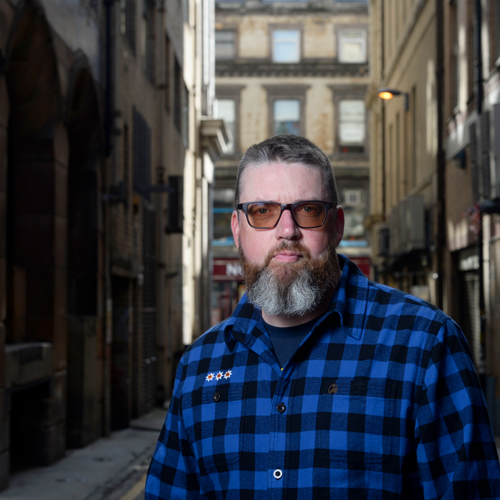Books of my life by Liam McIlvanney
Liam McIlvanney (MA 1990) had been teaching and researching Scottish literature for over a decade before he considered the possibility of writing fiction himself. His third novel, 'The Quaker', won the McIlvanney Prize for Scottish Crime Book of the Year in 2018, an award named after his father, fellow writer William McIlvanney. It is the book he is most proud of having written, he says. "The fact that I worked harder on it than any of the others may have something to do with that!"
The book that makes me laugh the most
PG Wodehouse is the finest comic writer I’ve ever read or can imagine reading. ‘The Code of the Woosters’ is his masterpiece, featuring Bertie Wooster’s trademark blend of fastidiousness and vagueness: "He spoke with a certain what-is-it in his voice, and I could see that, if not actually disgruntled, he was far from being gruntled." I’ve always thought that there are strong stylistic correspondences between Wodehouse and Samuel Beckett (another masterful comic writer), though they do make an unlikely pair.
The book I come back to again and again
Every novel I’ve written has been, in some way, a version of Graham Greene’s ‘The Quiet American’. I’m not sure why I remain so obsessed with this novel. I was introduced to it as a Politics undergrad by Dr Christopher Mason, who told us that we couldn’t understand colonialism in Indo-China without reading this novel. I’ve been reading it pretty much on a loop ever since.
The book I loved most as a child
As a child, my favourite writer was Ray Bradbury. I’m not a big fan of science fiction, but I loved Bradbury. His short stories, which often feature a surprising twist, are perfect for kids but also taught me a great deal about how stories work. ‘The Golden Apples of the Sun’ is my favourite of his books.
The book that gets me through the hard times
There is something in the chorus-like narrative voice of Lewis Grassic Gibbon’s ‘Sunset Song’, that I find deeply consoling, attuned both to the values of the "folk" and to the vivid specificities of (heroine) Chris Guthrie’s consciousness. It’s a book about how nothing endures, but the novel’s own narrative voice remains one of the enduring treasures of Scottish literature.
The book I wish I'd written
'The Prime of Miss Jean Brodie' is an absolutely note-perfect novel. Muriel Spark never puts a foot wrong or uses a needless word throughout the whole course of the book.
The book that changed my mind
Joan Didion’s ‘The Year of Magical Thinking’ made me look at grief in a whole new way. But then, everything Joan Didion writes makes me look at things in a whole new way.
The book I’m currently reading
I always have lots of books on the go. I’m currently savouring Hilary Mantel’s magnificent Wolf Hall trilogy, which is very clearly one of the landmark literary achievements of the early 21st century. I’m also re-reading Ross Macdonald’s criminally underrated Lew Archer novels and filling in the gaps in my reading of Michael Connelly’s Bosch novels. Connelly is the absolute master of the police procedural. There’s no-one who comes near him.
Liam is currently completing the sequel to 'The Quaker', set in 1975. DI Duncan McCormack, back in Glasgow after a stint down in London with the Met, is investigating the brutal murder of a local businessman and former politician against a backdrop of strikes, terrorist bombings and gang feuds.
This article was first published June 2020.
LIAM MCILVANNEY

Photo: Kirsty Anderson
“The great thing about having a writer for a father* was that it made writing seem a completely ordinary way to make a living. It was just something that my old man did in our front room, with an A4 pad and a cheap blue biro. People will always make the connection between us, but we're very different writers, and when you’re actually sitting down with a blank page in front of you, it’s the last thing on your mind.”
"The best piece of writing advice I've been given was from (crime novelist) Michael Connelly. I asked him about his writing routine and whether he attempted a daily target of words. He said, 'I just try to move the investigation forward in some way every day'. That's now what I try to do when I'm writing a crime novel."
*Liam's father, William McIlvanney, was an award-winning novelist, poet and UofG alumnus whose work is regarded as establishing the Scottish crime-writing genre of "Tartan Noir". He died in 2015.

